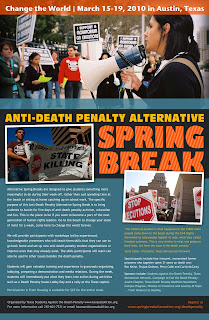Please call Gov Perry at (512) 463-2000 and urge him to stop the execution of Hank Skinner on March 24, 2010 by granting a 30-day stay of execution so that DNA evidence can be tested. Call anytime day or night and leave message on voice mail.
Austin American-Statesman Editorial Board:
If all goes as planned by the state of Texas, tomorrow will be the final sunrise Henry W. Skinner ever sees. Skinner, 47, is scheduled to be executed at 6 p.m. Wednesday for a brutal triple-murder committed in Pampa on New Year’s Eve 1993.
We believe that even the most ardent supporters of capital punishment, confronted with the facts below, will join Skinner in asking Gov. Rick Perry for a 30-day reprieve.
In fact, the most ardent supporters of capital punishment — those most invested in making sure Texas does not execute an innocent person — are the ones who should be leading the call for the delay.
There are seven untested items that contain DNA that could be dispositive of Skinner’s claim that he was falsely convicted.
The state has blocked that testing, noting that Skinner passed on a chance to have the testing done prior to his 1995 trial. That decision was made by Skinner’s trial lawyer, who, noting that other DNA tests on items found at the crime scene damaged his case, didn’t want further testing.
Now, Skinner — represented by the Capital Punishment Center at the University of Texas School of Law — wants Gov. Rick Perry to use his authority to delay the execution for 30 days and order the DNA testing. The Texas Board of Pardons and Paroles, in a 7-0 vote, on Monday recommended against a commutation or reprieve.
Can there be anybody who does not see the reprieve request as a harmless one that should be granted, especially because there is Texas precedent for it?
Jurors, working with testimony including some crucial portions later recanted, convicted Skinner of killing his girlfriend Twila Busby and her sons, Elwin Caler, 22, and Randy Busby, 20, at the Pampa home the four of them shared. Circumstantial evidence offered at the trial was tainted by seeming inconsistencies, including evidence showing Skinner was so incapacitated by drugs and alcohol that it was doubtful he could have stood up, much less kill three people (including the 6-foot-6-inch, 225-pound Busby).
“Evidence developed since Mr. Skinner’s trial raises the level of doubt to full-scale alarm that the jury’s verdict may very well have been wrong,” Skinner’s lawyers told Perry in a letter dated March 11 in which they offer a compelling interpretation of facts pointing to another possible suspect — now dead — with possible motive to commit the crime.
And, Skinner’s lawyers told the governor, DNA on the untested items could prove whether jurors erred.
“While Texans undoubtedly support capital punishment, they insist that it be reserved for those who are clearly guilty,” the lawyers told Perry.
In December 2004, Perry granted a 30-day reprieve for Frances Newton, a death row inmate who maintained her innocence in the shooting deaths of her husband and two children. Newton claimed that retesting of gunpowder residue from the crime scene would clear her.
It did not, and Newton was killed by the state in September 2005.
In granting the Newton reprieve, Perry wrote that “Justice delayed in this case is not justice denied.”
Perry is very familiar with the importance of DNA testing. He recently, as a result of DNA evidence, pardoned Tim Cole, who spent 13 years in prison for a rape the tests showed he did not commit. Sadly, as Perry noted, the pardon — the first posthumous one granted in Texas — came nine years after Cole died in prison.
Last Friday, Perry went to Fort Worth to present the pardon to Cole’s family.
“It means the world to me to be here today to look you in the eye and tell you that your son is pardoned,” Perry told Ruby Session, Cole’s mom. “I know that nothing that anyone in this room, this state, or this world can do could restore Tim to life, but we can state clearly, with the full weight of Texas law behind us, that your son was no criminal.”
By delaying the Skinner execution and ordering the DNA tests, Perry can make sure that no Texas governor ever has to apologize to Skinner’s family.
We agree with former Bexar County District Attorney Sam Millsap, who, weighing in on Skinner’s behalf, noted that “DNA evidence could show we’ve got the wrong man. … but the state inexplicably has blocked that testing for more than a decade.”
Millsap, in a column published in the Houston Chronicle, noted Skinner’s lawyers also have asked federal courts to delay the execution.
“But frankly, I’d rather see Texas clean up its own house on this one,” Millsap wrote. “Before we send a man to his death, shouldn’t we do everything in our power to be certain of his guilt?”
It is not a rhetorical question.











